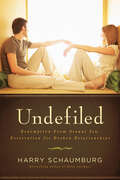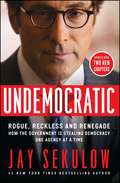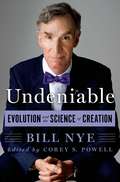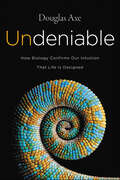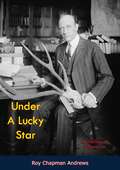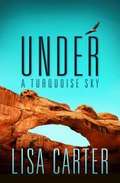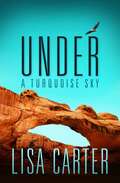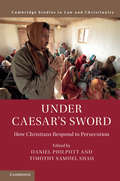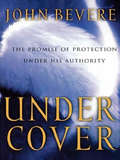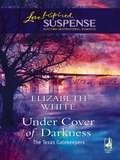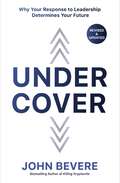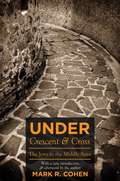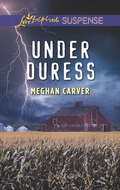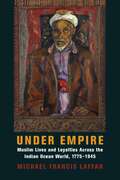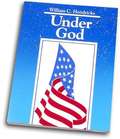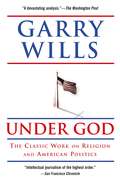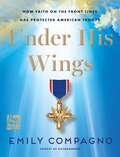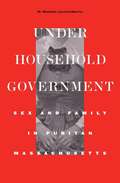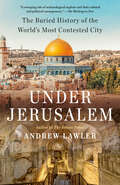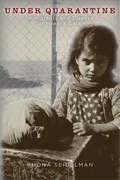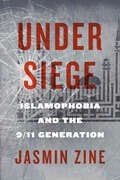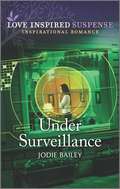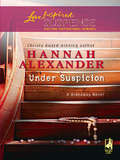- Table View
- List View
Undefiled: Redemption From Sexual Sin, Restoration for Broken Relationships
by Harry SchaumburgAmid the chaos of cybersex, impersonal sex, adultery, homosexuality, and sexual dissatisfaction in marriage, Undefiled calls readers toward a new kind of spiritual and sexual revolution. Sexual impurity creates a vicious circle, one that springs from misconceptions about Christ and further taints our understanding of Him. Yet another circle is available to men and women trapped in sexual sin, a circle of sexual redemption.When practiced as God intends, spirituality and sexuality both draw us closer to Christ. Spiritual maturity and sexual maturity go hand-in-hand, and together they hold out the promise of redemption and restoration needed by everyone who has been damaged by sexual sin.There is hope. Real change is possible; true intimacy is available. To the person who has failed time and time again sexually, God&’s message is simple: You, too, can be undefiled.
Undefiled: Redemption From Sexual Sin, Restoration for Broken Relationships
by Harry SchaumburgAmid the chaos of cybersex, impersonal sex, adultery, homosexuality, and sexual dissatisfaction in marriage, Undefiled calls readers toward a new kind of spiritual and sexual revolution. Sexual impurity creates a vicious circle, one that springs from misconceptions about Christ and further taints our understanding of Him. Yet another circle is available to men and women trapped in sexual sin, a circle of sexual redemption.When practiced as God intends, spirituality and sexuality both draw us closer to Christ. Spiritual maturity and sexual maturity go hand-in-hand, and together they hold out the promise of redemption and restoration needed by everyone who has been damaged by sexual sin.There is hope. Real change is possible; true intimacy is available. To the person who has failed time and time again sexually, God&’s message is simple: You, too, can be undefiled.
Undemocratic: How Unelected, Unaccountable Bureaucrats Are Stealing Your Liberty and Freedom
by Jay SekulowJay Sekulow--one of America's most influential attorneys--explores the current political landscape in which bureaucracy has taken over our government and provides a practical roadmap to help take back our personal liberties.Jay Sekulow is on a mission to defend Americans' freedom. The fact is that freedom is under attack like never before. The threat comes from the fourth branch of government--the biggest branch--and the only branch not in the Constitution: the federal bureaucracy. The bureaucracy imposes thousands of new laws every year, without a single vote from Congress. The bureaucracy violates the rights of Americans without accountability--persecuting adoptive parents, denying veterans quality healthcare, discriminating against conservatives and Christians for partisan purposes, and damaging our economy with job-killing rules. Americans are bullied by the very institutions established to protect their right to life, liberty, and the pursuit of happiness. Our nation's bureaucrats are on an undemocratic power trip. But Jay has a plan to fight back. We can resist illegal abuse, we can reform a broken system, and we can restore American democracy. This book won't just tell you how to win, it will show you real victories achieved by Jay and the American Center for Law and Justice. Unless we can roll back the fourth branch of government--the most dangerous branch--our elections will no longer matter. Undemocratic is a wake-up call, a call made at just the right time--before it's too late to save the democracy we love.
Undeniable: Evolution And The Science Of Creation
by Bill Nye Corey S. Powell"Evolution is one of the most powerful and important ideas ever developed in the history of science. Every question it raises leads to new answers, new discoveries, and new smarter questions. The science of evolution is as expansive as nature itself. It is also the most meaningful creation story that humans have ever found. "--Bill Nye <P> Sparked by a controversial debate in February 2014, Bill Nye has set off on an energetic campaign to spread awareness of evolution and the powerful way it shapes our lives. In Undeniable: Evolution and the Science of Creation, he explains why race does not really exist; evaluates the true promise and peril of genetically modified food; reveals how new species are born, in a dog kennel and in a London subway; takes a stroll through 4. 5 billion years of time; and explores the new search for alien life, including aliens right here on Earth. With infectious enthusiasm, Bill Nye shows that evolution is much more than a rebuttal to creationism; it is an essential way to understand how nature works--and to change the world. It might also help you get a date on a Saturday night.
Undeniable: How Biology Confirms Our Intuition That Life Is Designed
by Douglas AxeNamed A Best Book of the Year by World MagazineThroughout his distinguished and unconventional career, engineer-turned-molecular-biologist Douglas Axe has been asking the questions that much of the scientific community would rather silence. Now, he presents his conclusions in this brave and pioneering book. Axe argues that the key to understanding our origin is the “design intuition”—the innate belief held by all humans that tasks we would need knowledge to accomplish can only be accomplished by someone who has that knowledge. For the ingenious task of inventing life, this knower can only be God.Starting with the hallowed halls of academic science, Axe dismantles the widespread belief that Darwin’s theory of evolution is indisputably true, showing instead that a gaping hole has been at its center from the beginning. He then explains in plain English the science that proves our design intuition scientifically valid. Lastly, he uses everyday experience to empower ordinary people to defend their design intuition, giving them the confidence and courage to explain why it has to be true and the vision to imagine what biology will become when people stand up for this truth.Armed with that confidence, readers will affirm what once seemed obvious to all of us—that living creatures, from single-celled cyanobacteria to orca whales and human beings, are brilliantly conceived, utterly beyond the reach of accident.Our intuition was right all along.
Under A Lucky Star: A Lifetime of Adventure
by Roy Chapman AndrewsAll the world knows that Roy Chapman Andrews is the discoverer of the dinosaur Eggs, for these small and fragile relics of an inconceivably remote past fired the public’s imagination and were the sensation of their day. These eggs, however, were only an incident, and by no means the most important incident, in a rich, exciting, and valuable career. Now Andrews looks back over that life, weighs the relative importance of its many chapters, relives the finest moments, and regards with wonder the chance and good fortune that shaped his way.The author’s position as a naturalist is almost unique in that he was both a field operation and museum man, both an explorer and an administrator. His book, thus, is only in part concerned with the many voyages—landmarks of scientific history—that began with the first scientific study of the whale and culminated in the great forays into the forbidding Gobi region in quest of the birthplace of mammal life. Andrews has been on the staff of the American Museum of Natural History for almost all his adult life, and he records fascinating glimpses of the adventures and discoveries that take place behind the doors marked “private”. A man who attempts expeditions on the grand scale, moreover, must be a financier, a field marshal, and at times a diplomat of no mean subtlety. Andrews played all those roles with gusto, and recalls here the outstanding exploits.And the author is not a specialist whose vision is confined to bones and carcasses and show cases. He was for many years a leading figure in the hectic international society of the Orient, and he gives unforgettable pictures of life in Yokohama, Singapore, Tokyo, Port Said, Peking, and other storied cities of the East.Andrews believes he was born under a lucky star. The reader will decide that he hitched his wagon to it and had the courage to hang on. It is an enviable life he has led; it makes wonderfully engrossing reading.
Under A Turquoise Sky
by Lisa CarterWhen federal agent Aaron Yazzie is assigned to protect the only witness to a drug cartel execution, he hides Kailyn Eudailey in the safest place he knows . . . the vast, untamed wilderness of the Navajo Reservation. Transporting Kailyn to New Mexico may not be as easy as Aaron would like. Kailyn is a high-maintenance Southern belle who is determined to assert her independence at every step. Although Aaron's job is to protect her from the dangers that could get them both killed, Kailyn is getting to him. As an undercover agent, Aaron has grown adept at playing many roles. But will he be able to embrace his true identity and God's plan for his life in order to keep Kailyn alive?
Under A Turquoise Sky
by Lisa CarterWhen federal agent Aaron Yazzie is assigned to protect the only witness to a drug cartel execution, he hides Kailyn Eudailey in the safest place he knows . . . the vast, untamed wilderness of the Navajo Reservation. Transporting Kailyn to New Mexico may not be as easy as Aaron would like. Kailyn is a high-maintenance Southern belle who is determined to assert her independence at every step. Although Aaron's job is to protect her from the dangers that could get them both killed, Kailyn is getting to him. As an undercover agent, Aaron has grown adept at playing many roles. But will he be able to embrace his true identity and God's plan for his life in order to keep Kailyn alive?
Under Caesar's Sword: How Christians Respond to Persecution (Cambridge Studies in Law and Christianity)
by Daniel Philpott Timothy Samuel ShahThe global persecution of Christians is an urgent human rights issue that remains under-reported. <P><P>This volume presents the results of the first systematic global investigation into how Christians respond to persecution. World-class scholars of global Christianity present first-hand research from most of the sites of the harshest persecution as well as the West and Latin America. Their findings make clear the nature of persecution, the reasons for it, Christian responses to it - both non-violent and confrontational - and the effects of these responses. Motivating the volume is the hope that this knowledge will empower all who would exercise solidarity with the world's persecuted Christians and will offer the victims strategies for a more effective response. This book is written for anyone concerned about the persecution of Christians or more generally about the human right of religious freedom, including scholars, activists, political and religious leaders, and those who work for international organizations.<P> Brings attention to the under-reported plight of persecuted Christians;.<P>Includes details of persecution in twenty-four countries.<P>Will help activists and officials respond more effectively to persecution.
Under Cover
by John BevereThis well loved writer effectively uses his personal mistakes to illustrate riveting truths about repentance and forgiveness. As he focuses on the true authority of God, he is careful to explain by example the important difference between "submission" and "obedience."The same struggle with divine authority is also represented through the lives of John the Baptist, the Apostle Paul, and other biblical figures. An especially helpful book for Christians who want to develop a serious pursuit of God.
Under Cover of Darkness (The Texas Gatekeepers)
by Elizabeth WhiteThe life of U. S. Border Patrol agent Jack Torres is forever changed the night his partner is killed near the border city of Eagle Pass, Texas. Jack's newfound faith in Christ is shaken to the core as he sets out to break up the gang of smugglers responsible for his friend and mentor's violent death. His quest leads him to Fort Worth, where he goes undercover in a landscaping company. Jack suspects the company's manager of colluding with a rogue Border Patrol agent to bring illegal aliens across the border and sell them to companies looking for cheap labor. His lovely young boss, landscape architect Meg St. John, seems innocent of the scheme, having taken the project in the hopes it will lead to a promotion into the design office. But as their relationship deepens, so does the danger surrounding them. Jack struggles with involving Meg in the dangerous world of alien smuggling, but she is the only he can trust.
Under Cover: Why Your Response to Leadership Determines Your Future
by John BevereHave you ever wrestled with how to respond to a boss or leader when you disagree? Do you ever wonder why you should listen to them in the first place?In this newly revised and updated edition, bestselling author John Bevere reemphasizes for a new generation the protective boundaries God provides through authority figures. John reveals how the enemy tricks us into believing our true destinies can be found away from divine leadership by distorting our ability to recognize God's inherent authority and His delegated authority. By teaching us how to properly relate to leadership, John shows why living under authority provides a place where there is provision, protection, and hope for the future.Under Cover will also help you discover:how to avoid being entirely right yet somehow wrongthe biblical way to respond to and overcome unfair treatmentComplete with a brand-new chapter, discussion questions, and highlighted themes, Under Cover is a practical, life-transforming book that reveals the importance of submission to God's authority and how to respond to the leaders in our lives.
Under Crescent And Cross: The Jews In The Middle Ages
by Mark R. CohenDid Muslims and Jews in the Middle Ages cohabit in a peaceful "interfaith utopia"? Or were Jews under Muslim rule persecuted, much as they were in Christian lands? Rejecting both polemically charged ideas as myths, Mark Cohen offers a systematic comparison of Jewish life in medieval Islam and Christendom--and the first in-depth explanation of why medieval Islamic-Jewish relations, though not utopic, were less confrontational and violent than those between Christians and Jews in the West. Under Crescent and Cross has been translated into Turkish, Hebrew, German, Arabic, French, and Spanish, and its historic message continues to be relevant across continents and time. This updated edition, which contains an important new introduction and afterword by the author, serves as a great companion to the original.
Under Duress (Mills And Boon Love Inspired Suspense Ser.)
by Meghan CarverOnly one man can help a mother and daughter on the run in this action-packed, bestselling inspirational thriller from the author of Deadly Disclosure.Criminals are trying to kidnap attorney Samantha Callahan’s adopted daughter, Lily—and she has no idea why. So when bullets start flying, Samantha and Lily speed off in her car . . . and crash right into help. Ex-cop Reid Palmer is shocked when former law school classmate Samantha rear-ends his car and then climbs in with her daughter and begs him to drive. Now they are on the run, and Reid will do anything to protect them and figure out why kidnappers are after Lily. As they struggle to evade capture, Reid begins to realize that Samantha is more to him than just a woman in trouble. But with the enemies closing in and their motives finally revealed, will Reid be able to make sure justice is served?
Under Empire: Muslim Lives and Loyalties Across the Indian Ocean World, 1775–1945 (Columbia Studies in International and Global History)
by Michael Francis LaffanAn imam banished from eastern Indonesia to the Cape of Good Hope in 1780 builds a new Muslim community with a mix of fellow exiles, enslaved people, and even the men tasked with supervising his detention. Nineteenth-century colonial chroniclers invent the legend of the “loyal Malay” warrior, whose anger can be tamed through the “mildness” of British rule. A Tunisian-born teacher who arrived in Java from Istanbul in the early twentieth century becomes an enterprising Arabic-language journalist caught between competing nationalisms.Telling these stories and many more, Michael Francis Laffan offers a sweeping exploration of two centuries of interactions among Muslim subjects of empires and future nation-states around the Indian Ocean world. Under Empire traces interlinked lives and journeys, examining engagements with Western, Islamic, and pan-Asian imperial formations to consider the possibilities for Muslims in an imperial age. It ranges from the dying era of the trading companies in the late eighteenth century through the period of Dutch and British colonial rule up to the rise of nationalist and cosmopolitan movements for social reform in the nineteenth and twentieth centuries. Laffan emphasizes how Indian Ocean Muslims by turns asserted loyalty to colonial states in pursuit of a measure of religious freedom or looked to the Ottoman Empire or Egypt in search of spiritual unity. Bringing the history of Southeast Asian Islam to African and South Asian shores, Under Empire is an expansive and inventive account of Muslim communal belonging on the world stage.
Under God (Sixth Edition)
by William C. HendricksThe goal of Under God is to develop effective citizens within the framework of the Christian faith and Christian principles. To help students attain this goal, Under God includes sound ideas about the foundations of constitutional government and the historical background of United States government.
Under God: Religion and American Politics
by Garry WillsIn Under God, Garry Wills, one of our liveliest and most eminent political observers, moves through the tapestry of American history, illuminating the instances where American politics and American religion have collided. Beginning with the 1988 presidential contest, an election that included two ministers and a senator accused of sin, Wills surveys our history to show the continuity of present controversies with past religious struggles and argues that the secular standards of the Founding Fathers have been misunderstood. He shows that despite reactionary fire-breathers and fanatics, religion has often been a progressive force in American politics and explains why the policy of a separate church and state has, ironically, made the position of the church stronger. Marked by the extraordinary quality of observation that has defined the work of Garry Wills, Under God is a rich, original look at why religion and politics will never be separate in the United States.
Under Gods Sky: Reflections for Christian Men
by John R HardisonReal Christian stories about life for real Christian men. Under God's Sky traces the real-life experiences of author John Hardison and exposes the power and majesty of God's creation. The author's personal stories offer you and other Christian men a solidly-biblical perspective on many topics including: Love Loneliness War The loss of a child Setting a Christian example The great outdoors And more! From his childhood on a cattle ranch in California to his current residence near Yakima, Washington, Hardison's journey presents you with both life lessons and spiritual insights in this great book for personal reading or devotions.
Under His Wings: How Faith on the Front Lines Has Protected American Troops
by Emily CompagnoAn Instant #1 New York Times BestsellerIn this celebration of faith and freedom, Fox News Co-Host Emily Compagno shares first person accounts that show the profound role belief in God has played in the lives of U.S. military servicemembers as they served in combat from World War I to today—commemorating the courage, camaraderie, spirit, and sacrifice of America’s heroes.In this moving and evocative collection, Emily Compagno explores the enduring role faith has played in the lives of American soldiers during wartime. Descending from a long line of respected Navy and US Army veterans, Compagno offers unique insight into the importance of faith during times of hardship. She shares stories from generations of servicemen along with her own experience visiting American troops in Iraq and Kuwait when she was a cheerleader for the Oakland Raiders.From World War I to current conflicts in the Middle East, Under His Wings blends the historical with the personal, featuring first-hand accounts from veterans whose religious beliefs emboldened them to persevere as they faced their own mortality on the fields of battle.Each chapter is highlighted by a range of fascinating stories, including celebrity visits to the frontlines with the USO—from Marilyn Monroe to President Ronald Reagan—, as well as heartfelt letters between soldiers and their loved ones and treasured family photographs.Following the massive success of Modern Warriors, Faith Still Moves Mountains, and All American Christmas, this moving Fox News book is both an homage to the spirit of prayer and a heartfelt thank-you to our troops. Sure to become a treasured keepsake, Under His Wings is an inspiring reminder of the power of faith that will uplift the spirit through the holidays and beyond, for years to come.
Under Household Government
by M. Michelle Jarrett MorrisThe Puritans were not as busy policing their neighbors’ behavior as Nathaniel Hawthorne or many early American historians would have us believe. Keeping their own households in line occupied too much of their time. Under Household Government reveals that family members took on the role of watchdogs in matters of sexual indiscretion.
Under Jerusalem: The Buried History of the World's Most Contested City
by Andrew LawlerA sweeping history of the hidden world below the Holy City—a saga of biblical treasures, intrepid explorers, and political upheaval "These untold stories of archeological digs near and under Jerusalem&’s sacred sites convey all the colorful and violent and contentious history of the Israeli-Palestinian conflict ... A compulsive read.&” —Kai Bird, Pulitzer Prize–winning historian and author of The OutlierIn 1863, a French senator arrived in Jerusalem hoping to unearth relics dating to biblical times. Digging deep underground, he discovered an ancient grave that, he claimed, belonged to an Old Testament queen. News of his find ricocheted around the world, evoking awe and envy alike, and inspiring others to explore Jerusalem&’s storied past. In the century and a half since the Frenchman broke ground, Jerusalem has drawn a global cast of fortune seekers and missionaries, archaeologists and zealots, all of them eager to extract the biblical past from beneath the city&’s streets and shrines. Their efforts have had profound effects, not only on our understanding of Jerusalem&’s history, but on its hotly disputed present. The quest to retrieve ancient Jewish heritage has sparked bloody riots and thwarted international peace agreements. It has served as a cudgel, a way to stake a claim to the most contested city on the planet. Today, the earth below Jerusalem remains a battleground in the struggle to control the city above. Under Jerusalem takes readers into the tombs, tunnels, and trenches of the Holy City. It brings to life the indelible characters who have investigated this subterranean landscape. With clarity and verve, acclaimed journalist Andrew Lawler reveals how their pursuit has not only defined the conflict over modern Jerusalem, but could provide a map for two peoples and three faiths to peacefully coexist.
Under Quarantine: Immigrants and Disease at Israel’s Gate
by Rhona SeidelmanUnder Quarantine is the riveting story of Shaar Ha’aliya, a central immigrant processing camp opened shortly after Israel became an independent state. This historic gateway for Jewish migration was surrounded by a controversial barbed wire fence. The camp administrators defended this imposing barrier as a necessary quarantine measure - even as detained immigrants regularly defied it by crawling out of the camp and returning at will. Focusing on the conflicts and complications surrounding the medical quarantine, this book brings the history of this place and the remarkable experiences of the immigrants who went through it to life. Evocative and bold, Under Quarantine shows that we cannot fully understand Israel until we understand Shaar Ha’aliya. The gate of arrival for nearly half a million immigrants - a space of homecoming, conflict, exclusion and welcoming - here was the country’s crucible.
Under Siege: Islamophobia and the 9/11 Generation (Advancing Studies in Religion)
by Jasmin ZineThe 9/11 attacks in the United States, the subsequent global “war on terror,” and the proliferation of domestic security policies in Western nations have had a profound impact on the lives of young Muslims, whose identities and experiences have been shaped within and against these conditions. The millennial generation of Muslim youth has come of age in these turbulent times, dealing with the aftermath and backlash associated with these events.Under Siege explores the lives of Canadian Muslim youth belonging to the 9/11 generation as they navigate these fraught times of global war and terror. While many studies address contemporary manifestations of Islamophobia and anti-Muslim racism, few have focused on the toll this takes on Muslim communities, especially among younger generations. Based on in-depth interviews with more than 130 young people, youth workers, and community leaders, Jasmin Zine’s ethnographic study unpacks the dynamics of Islamophobia as a system of oppression and examines its impact on Canadian Muslim youth. Covering topics such as citizenship, identity and belonging, securitization, radicalization, campus culture in an age of empire, and subaltern Muslim counterpublics and resistance, Under Siege provides a unique and comprehensive examination of the complex realities of Muslim youth in a post-9/11 world.Twenty years after the 9/11 attacks, Zine reveals how the global war on terror and heightened anti-Muslim racism have affected a generation of Canadians who were socialized into a world where their faith and identity are under siege.
Under Surveillance (K-9 Search And Rescue Ser. #2)
by Jodie BaileyShe might not be the criminal he thinks she is…When his neighbor—and suspect—Macey Price is attacked and nearly kidnapped, army operative Trey Blackburn comes to her rescue. But this new development throws a wrench in his undercover assignment to surveil and befriend Macey. Is she a traitor selling government secrets…or is she being framed? The rules no longer apply, because in one night his mission changes—from proving her guilt to saving her life.From Harlequin Love Inspired Suspense: Courage. Danger. Faith.
Under Suspicion
by Hannah AlexanderA KILLER LURKS IN THE SHADOWS. . . UNTIL IT'S TIME TO STRIKE AGAIN. When a prominent senator is murdered in his own home, his daughter Shona Tremaine becomes the prime suspect in his death. Only her estranged husband, Geoff, and younger sister, Karah Lee, believe in her innocence--until an attempt on Shona's own life clears her name. Who would want her dead? As Shona and Geoff work together to solve the mystery, they uncover a web of deceit and corruption in her father's life--and discover the love they thought they'd lost. But will their renewed commitment be enough to save Shona's life?
